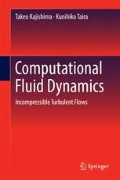Abstract
Finite-difference methods are numerical methods that find solutions to differential equations using approximate spatial and temporal derivatives that are based on discrete values at spatial grid points and discrete time levels. As the grid spacing and time step are made small, the error due to finite differencing becomes small with correct implementation. In this chapter, we present the fundamentals of the finite-difference discretization using the advection-diffusion equation, which is a simple model for the Navier–Stokes equations.
Access this chapter
Tax calculation will be finalised at checkout
Purchases are for personal use only
Notes
- 1.
The terms advection and convection are often used interchangeably. Technically speaking, convection refers to the combined transport by advection and diffusion. Thus, we use advection and convection with careful distinction in this book.
- 2.
Similar idea is used for evaluating temporal derivatives if data is available only from past time.
- 3.
We restate Eqs. (2.1)–(2.3) for clarity
$$ \frac{\partial (fg)}{\partial x} = f \frac{\partial g}{\partial x} + \frac{\partial f}{\partial x} g, \quad \frac{\partial ^2 f}{\partial x^2} = \frac{\partial }{\partial x} \left( \frac{\partial f}{\partial x} \right) , \quad \text {and} \quad \frac{\partial ^2 f}{\partial x \partial y} = \frac{\partial }{\partial x} \left( \frac{\partial f}{\partial y} \right) = \frac{\partial }{\partial y} \left( \frac{\partial f}{\partial x} \right) . $$.
- 4.
Splitting methods are not limited to time domains. One can treat upwind and downwind fluxes in a different fashion, which results in flux splitting methods .
- 5.
The stability of the leapfrog method is depicted in Fig. 2.14.
- 6.
Implicitly solving for the derivative may increase the computational cost. However, this translates to the differencing stencil being all coupled, which shares similarity with spectral methods.
References
Fujii, K.: Numerical Methods for Computational Fluid Dynamics. Univ. Tokyo Press, Tokyo (1994)
Lambert, J.D.: Computational Methods in Ordinary Differential Equations. Wiley, London (1973)
Lele, S.K.: Compact finite difference schemes with spectral-like resolution. J. Comput. Phys. 103, 16–42 (1992)
Lomax, H., Pulliam, T.H., Zingg, D.W.: Fundamentals of Computational Fluid Dynamics. Springer, New York (2001)
Wade, W.R.: Introduction to Analysis, 4th edn. Pearson (2009)
Williamson, J.H.: Low-storage Runge-Kutta schemes. J. Comput. Phys. 35(1), 48–56 (1980)
Author information
Authors and Affiliations
Corresponding authors
Rights and permissions
Copyright information
© 2017 Springer International Publishing AG
About this chapter
Cite this chapter
Kajishima, T., Taira, K. (2017). Finite-Difference Discretization of the Advection-Diffusion Equation. In: Computational Fluid Dynamics. Springer, Cham. https://doi.org/10.1007/978-3-319-45304-0_2
Download citation
DOI: https://doi.org/10.1007/978-3-319-45304-0_2
Published:
Publisher Name: Springer, Cham
Print ISBN: 978-3-319-45302-6
Online ISBN: 978-3-319-45304-0
eBook Packages: EngineeringEngineering (R0)

